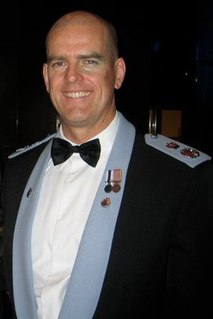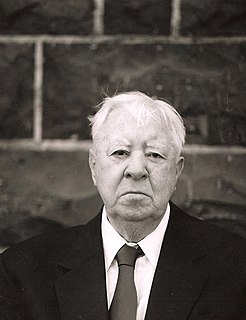Related Research Articles

The Archibald Prize is an Australian portraiture art prize for painting, generally seen as the most prestigious portrait prize in Australia. It was first awarded in 1921 after the receipt of a bequest from J. F. Archibald, the editor of The Bulletin who died in 1919. It is administered by the trustees of the Art Gallery of New South Wales and awarded for "the best portrait, preferentially of some man or woman distinguished in Art, Letters, Science or Politics, painted by an artist resident in Australia during the twelve months preceding the date fixed by the trustees for sending in the pictures". The Archibald Prize has been awarded annually since 1921 and since July 2015 the prize has been AU$100,000.
A royal commission is a major ad-hoc formal public inquiry into a defined issue in some monarchies. They have been held in the United Kingdom, Australia, Canada, New Zealand, Norway, Malaysia, Mauritius and Saudi Arabia. A royal commission is similar in function to a commission of inquiry found in other countries such as Ireland, South Africa, and Hong Kong. It has considerable powers, generally greater even than those of a judge but restricted to the terms of reference of the commission. These powers include subpoenaing witnesses, taking evidence under oath and requesting documents.
The Gillies Report is an Australian topical satirical sketch comedy television series that was broadcast on the ABC between 1984 and 1985. The program was best known for sending up politicians and media personalities of the day such as Prime Minister Bob Hawke and Opposition Leader Andrew Peacock.

The Federated Ship Painters and Dockers Union (FSPDU) was an Australian trade union which existed between 1900 and 1993. It represented labourers in the shipbuilding industry, covering "mostly work associated with chipping, painting, scrubbing [and] cleaning [ships], working in every size of tanks, cleaning boilers, docking and undocking vessels, and rigging work".
Nugan Hand Bank was an Australian merchant bank that collapsed in 1980 after the suicide of one of its founders, Australian lawyer Francis John Nugan, resulting in a major scandal. News stories suggested that the bank had been involved in illegal activities, including drug smuggling, arranging weapons deals, and providing a front for the United States Central Intelligence Agency. Speculation grew when it became known that the bank had employed a number of retired United States military and intelligence officers, including former CIA director William Colby.

Thomas Eyre Forrest Hughes AO KC is an Australian former barrister and politician. A member of the Liberal Party, he served as Attorney-General in the Gorton Government from 1969 to 1971 and was a member of the House of Representatives from 1963 to 1972, representing the New South Wales seats of Parkes and Berowra. He is a former president of the New South Wales Bar Association and was one of Sydney's most prominent barristers for a number of decades. Hughes is the last surviving Liberal minister of the Gorton and McMahon Governments.
The National Crime Authority (NCA) was an Australian law enforcement agency established in 1984 and wound up on 31 December 2002.
Costigan is an Irish surname with higher concentrations in Counties Laois, Tipperary and Kilkenny. Costigan is thought to be a branch of the Fitzpatricks, although the name derives from Hodgkin, a dimin. of Roger. Notable people with the surname include:

Francis Xavier Costigan,, was an Australian lawyer, Royal Commissioner and social justice activist. Costigan is renowned for presiding over the Costigan Commission into organised crime.
Bottom of the harbour tax avoidance was a form of tax avoidance used in Australia in the 1970s. Legislation made it a criminal offence in 1980. The practice came to symbolise the worst of variously contrived tax strategies from those times.
Robert Clyde Packer, usually known as Clyde Packer, was the son of Australian newspaper magnate Frank Packer and the elder brother of media baron Kerry Packer. From 23 April 1964 to 22 April 1976 he was a Member of the New South Wales Legislative Council for the Liberal Party. Packer was originally intended to be his father's heir before a falling-out in 1972 resulted in Kerry inheriting the family business in 1974 upon Frank's death.

The Royal Commissions Act 1902 is an Australian Act of Parliament which authorises the Australian Governor-General to initiate an investigation, referred to as a Royal Commission. Royal Commissions are a major independent public inquiry into an issue, initiated by the Australian Government. They often investigate cases of political corruption or matters of significant public concern.

The New South Wales Crime Commission is a statutory corporation of the Government of New South Wales. It is constituted by the Crime Commission Act 2012, the object of which is to reduce the incidence of organised crime and other serious crime in the state of New South Wales, Australia.
Russell Neville Joseph Gorman was an Australian politician. He was an Australian Labor Party member of the Australian House of Representatives from 1983 to 1996, representing the electorate of Chifley. Gorman was the last veteran of the Second World War to serve in the House of Representatives.
Organised crime in Australia refers to the activities of various groups of crime families, organised crime syndicates or underworld activities including drug trafficking, contract killing, racketeering and other crimes in Australia.

Simon James Overland is the former Chief Executive Officer at the City of Whittlesea and a former Chief Commissioner of Victoria Police in Australia. He previously worked with the Australian Federal Police and then with Victoria Police focusing on Melbourne's gangland wars. On 2 March 2009 he was named by the Premier, John Brumby, as Victoria Police Chief Commissioner. He resigned from this position on 16 June 2011 after intense public pressure from critics who questioned his performance. In July 2011, he was appointed the chair of the Board of Management of the Tasmania University Union and was responsible for overseeing the direction of the student union.

Billy "The Texan" Longley was an underworld figure best known as a standover man on the Melbourne waterfront during the 1960s and 1970s.
Jack "Putty Nose" Nicholls was a Melbourne waterfront identity best known as Secretary of the Victorian Branch of the Painters and Dockers Union at the time of the Costigan Commission. Nicholls followed Pat Shannon as union secretary after he was murdered by Bill "The Texan" Longley.
Alan Reginald Neaves is a former Australian public servant, lawyer and judge, best known for his role as head of the Attorney-General's Department between 1979 and 1983, and as a Federal Court judge between 1983 and 1995.
References
- ↑ "Royal Commissions and Commissions of Inquiry". www.aph.gov.au. Parliament House, Canberra. Retrieved 10 April 2022.
- ↑ "A supreme advocate at criminal law". The Sydney Morning Herald. 29 October 2005. Retrieved 2 March 2019.
- ↑ "Editorial update". The Queensland Lawyer. Thomson Reuters (Professional) Australia Limited. 3 September 2012.
- ↑ "Costigan finds 'major fraud scheme'". The Canberra Times . Vol. 58, no. 17, 546. Australian Capital Territory, Australia. 13 October 1983. p. 1. Retrieved 3 March 2019– via National Library of Australia.
- ↑ "THE COSTIGAN REPORT". The Canberra Times . Vol. 59, no. 17, 932. Australian Capital Territory, Australia. 2 November 1984. p. 13. Retrieved 3 March 2019– via National Library of Australia.
- ↑ Costigan, Francis Xavier (1984). Royal Commission on the Activities of the Federated Ship Painters and Dockers Union, Final Report, Volume 3 (PDF). Australian Government Publishing Service. pp. 119–120.
- 1 2 "Packer cleared of Goanna allegations". The Canberra Times . Vol. 61, no. 18, 802. Australian Capital Territory, Australia. 27 March 1987. p. 1. Retrieved 3 March 2019– via National Library of Australia.
- ↑ "Packer begins legal action". The Canberra Times . Vol. 59, no. 17, 971. Australian Capital Territory, Australia. 11 December 1984. p. 1. Retrieved 3 March 2019– via National Library of Australia.
- ↑ McClymont, Kate (11 July 2005). "Missing: a mate with a loan for Packer". Sydney Morning Herald .
- ↑ "Packer denies crime ties". The Canberra Times . Vol. 59, no. 17, 898. Australian Capital Territory, Australia. 29 September 1984. p. 1. Retrieved 3 March 2019– via National Library of Australia.
- ↑ "National crime body to take over from Costigan inquiry". The Canberra Times . Vol. 58, no. 17, 572. Australian Capital Territory, Australia. 8 November 1983. p. 1. Retrieved 3 March 2019– via National Library of Australia.
- ↑ Shiel, Fergus (21 February 2006). "Costigan hits back at criticism". The Age .
- ↑ "Costigan hits back at Packer 'ignorance'". Sydney Morning Herald . AAP. 20 February 2006.